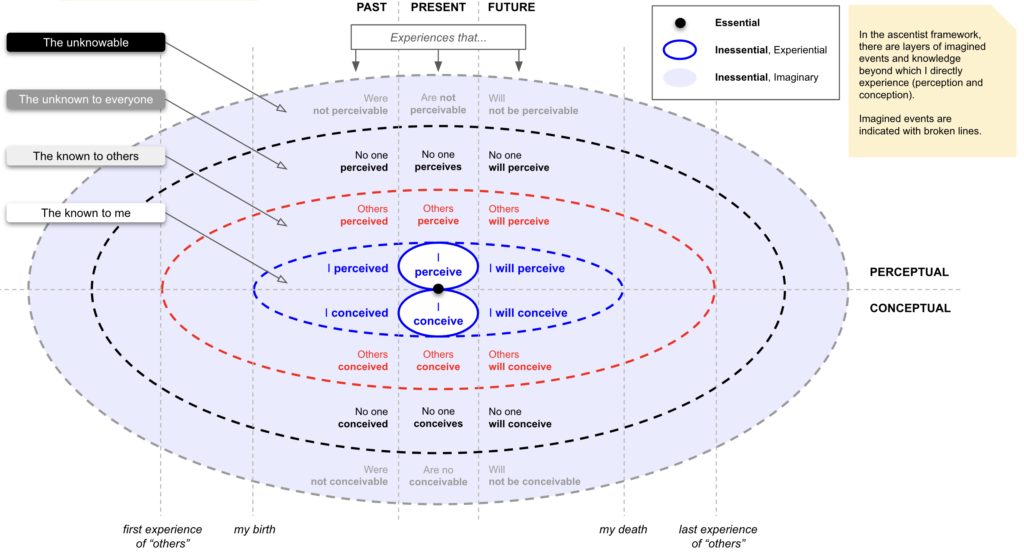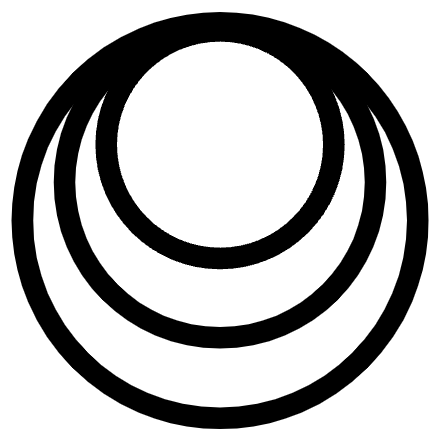The wider shared reality of people would have me believe that there is an endless world beyond my direct experience happening right now, in this moment. That there are seven billion other human beings having experiences right now. And in addition to those humans, there are trillions of other sentient beings from insects to animals also experiencing the world.
It would also have me believe that this collection of experiences stretches into the past back to the first experience of “others” (any sentient being). At some point, there would have been the first sentient experience of the world, and everything before that would have existed but without a being to experience it.
And of course, I am to also believe that this experience will continue into the future up until the very last sentient observer perishes, beyond which existence will continue to unfurl, albeit without a being to experience it.
If I were to plot this on a diagram, with my own experience (perceptual and conceptual) at the very center (in blue), it would look something like the diagram below.

I call this the ascentist distortion. It charts out the full range of reality from the perspective of beings who experience it and my relationship to it. Most importantly, it declares my limited knowledge relative to what is knowable. In this shared reality, I am just one micro-sized observer with a single, small perspective among potentially trillions of other perspectives, human and non-human alike.
But I must remember that this is all imaginary. It is entirely up to me whether I believe in this shared reality or not. It is my choice whether I know a small part of something or all of everything. This is a decision that I make based on my beliefs of what is real, knowable, and who I am within the fabric of reality. So if I have a choice in this matter, why would I choose to believe that which so clearly disempowers me?
If I assume it is a choice, then I have at least two options:
- Belief One: I can believe that I am a single, small observer among countless others within a wider shared reality, and most of what exists is unknown and unknowable to me. I am not omniscient: I do not know everything.
- Belief Two: I can believe that I can and do know absolutely everything. I am omniscient: I know everything.
The first option is the choice I have consciously made my entire life up to this point. I have accepted that there are other people just like me experiencing this world. I assume that they are experiencing the world just like me and I cannot physically or mentally access their own experiences. I believe that there are billions of them right now, and billions more who lived in the past, and even more in the future. I only directly observe and interact with a vanishingly small handful of these other people throughout the course of my life and my short time in this world.
The implications of omniscience are profound. If I can and do know everything, then the nature of this entire existence I awaken into every morning is called into question. Everything I once believed must be altered. There are a number of foundational beliefs in Belief One that I have to revisit and overcome in order to choose Belief Two. So I admit at first that I do not presently know everything, even if I want to believe that I do. I intuitively believe I know everything, but I do not possess the conviction to integrate that belief into my life in any meaningful way.
Achieving omniscience is a long process equal in duration to the time it has taken me to become convinced I know nothing. I do not actually need to learn anything more; I only need to relearn how to acknowledge what I already know and let go of all the things I have imagined were true but are not. The first step in reasserting my omniscience is to only speak about what I actually and directly know. Then, everything I speak about, I know. The rest of the path will unfold from that point.
…
